Samsung Galaxy S 2 (International) Review - The Best, Redefined
by Brian Klug & Anand Lal Shimpi on September 11, 2011 11:06 AM EST- Posted in
- Smartphones
- Samsung
- Galaxy S II
- Exynos
- Mobile
Battery
Even though it’s almost at the end of our review, battery life is hugely important, and measuring up how SGS2 does compared to the competition is a large part of what makes things pretty positive for the device. As a reminder, we measure battery life by having the browser load through a few dozen pages with brightness set on 200 nits until the phone dies, on both WiFi and cellular (WCDMA). The SGS2 has a capacious 6.11 Whr battery, which is among a small number of devices I’ve seen that come with over a 6 Whr battery by default.
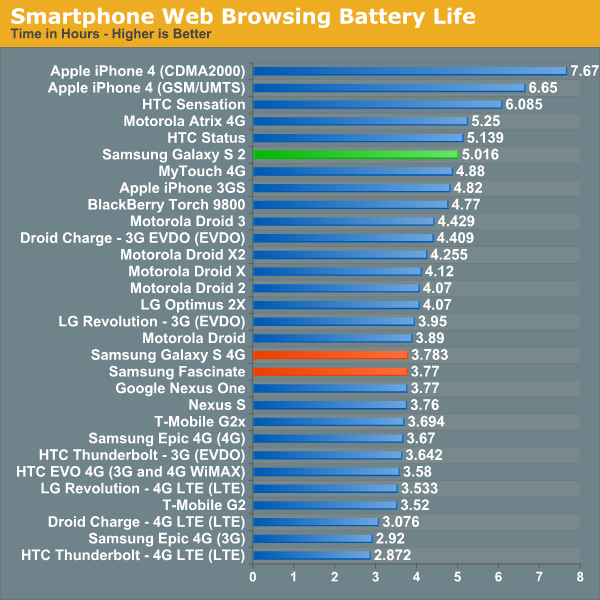
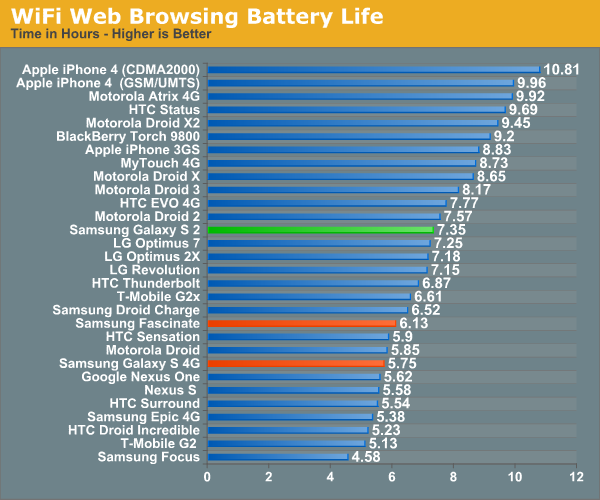
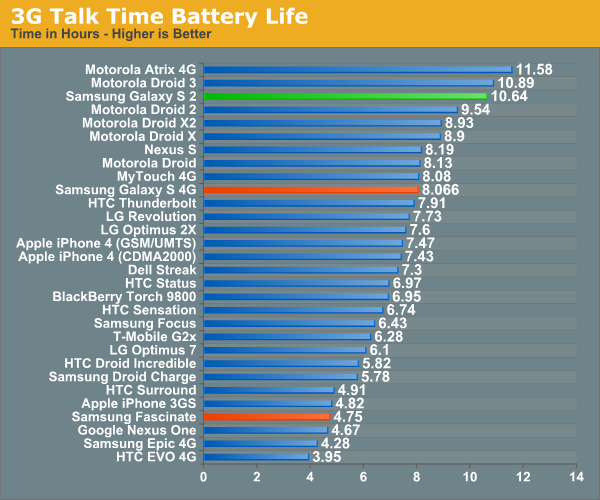
The SGS2 outperforms its predecessors pretty handily, and I’ve highlighted in orange those results from the Galaxy S 4G and Fascinate. When you factor in that SGS 4G has the same capacity 6.11 Whr battery, it’s obvious how much of the gains are both SAMOLED+ efficiency and a dual core SoC.
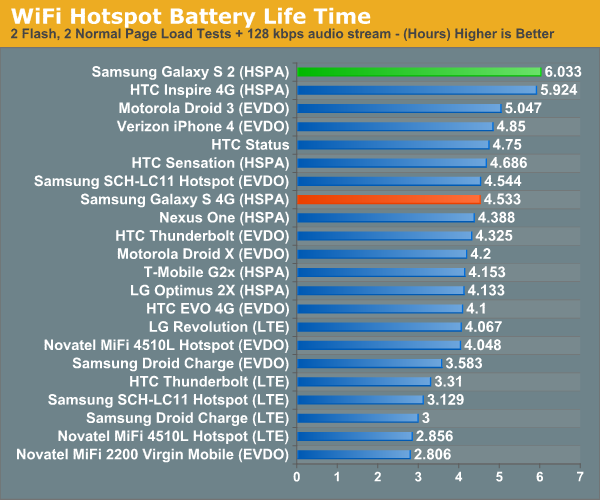
In the WiFi hotspot test, the SGS2 actually trounces everything else I’ve seen thus far as well, edging out the Inspire 4G. As a reminder, that test consists of loading 4 sets of the page load test alongside a 128 kbps MP3 stream with the display off until the phone dies.
The last thing to talk about with respect to battery life is the infamous “AOS Bug,” where AOS references the Android OS line item in the battery use window. I’ve read just about everything there is I could find on this bug, and believe it to just be related to how Android reports this metric based on CPU time that a process and its children use. Some have speculated this is something which has showed up with dual core SoCs. To be completely honest, I don’t put much stock in the line-item breakdown of battery use to begin with, what I look at is the graph view. Either way, the battery numbers above speak for themselves, and SGS2 battery life is definitely superior to the predecessor, AOS issue or not.
Conclusions and Final Thoughts
It’s always difficult to sum up a device like the SGS2, because this is such a major launch and so much has already been written and discovered about the phone. I find myself again thinking back to how long it’s been since we first played with the SGS2 at MWC and just how far the device has come. It literally is a completely different device today than what Anand and I played with chained to a table in Barcelona.
There’s no doubt in my mind that SGS2 is the most powerful smartphone out right now, both in the synthetics and in just subjective feel. That’s thanks in large part to Exynos 4210’s dual core Cortex A9s at 1.2 GHz and ARM’s Mali–400 GPU. The end result is an experience that’s buttery smooth and rarely shows any signs of being want for more power. Mali–400 alone is twice as fast as any other smartphone GPU out right now, and Exynos 4210 seems likely to vie for performance crown in Android-land until the start of 2012.
The original Galaxy S was a hugely popular Android phone, and thankfully the few issues that were around that generation have been ironed out this second time around. The result is a device that is better in almost every category. Battery life is longer than the predecessor. Performance is much higher. Super AMOLED uses the much more readable RGB stripe. GPS works this go around. Camera stills and video are awesome. The list goes on.
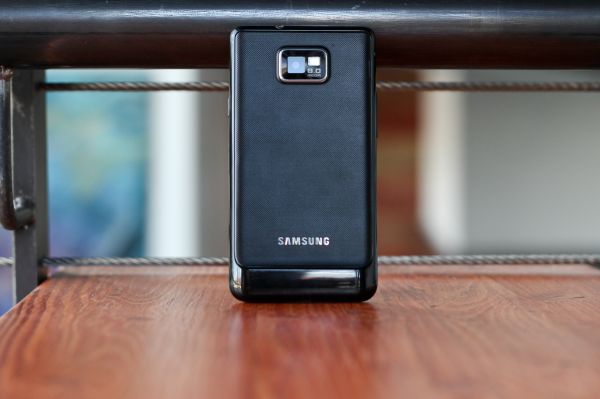
Some Photos Courtesy Sarah Trainor
That said there are still a few lingering areas which the SGS2 wavers. Audio quality from the Yamaha codec in the SGS2 isn’t up to the level of quality the Wolfson was capable of, and there are some potentially frustrating baseband instability issues we ran into as well. There’s also the notable omission of NFC in all but the Korean version of the SGS2, and it looks as though only certain variants coming to the USA will have NFC.
The international market is a whole lot more efficient than the situation we have to deal with here in the USA. Phones launch in largely the form the manufacturer originally intended them to, and as a result there’s a single target for both enthusiast ROM modders and the handset vendor to build and test software on. More and more, it’s really that kind of long-term support that makes a handset valuable, and SGS2 is such a huge success already that it isn’t likely to be obsolete in just a few months, even with Kal-El phones and a new Nexus looming on the horizon.
I really have to admit that I went into this review expecting to be massively underwhelmed with Galaxy S 2. Here we are at the end though, I find my thoughts about the device completely changed. Even taking into account the near term Android roadmap, Galaxy S 2 is the Android smartphone I’d absolutely buy today.


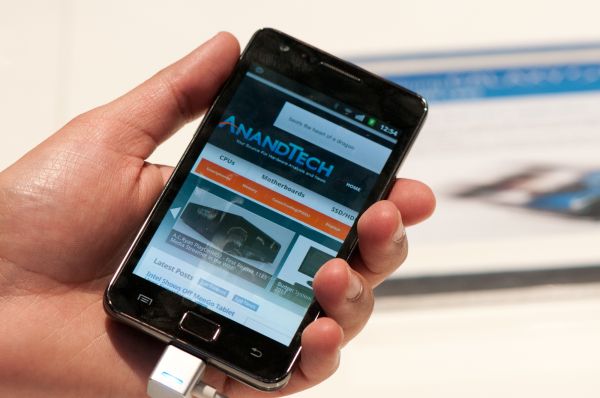
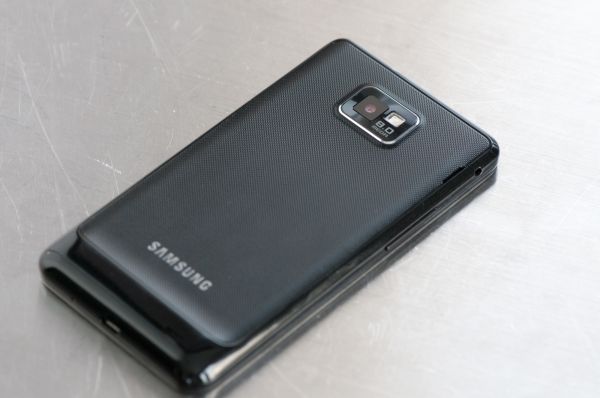








132 Comments
View All Comments
VivekGowri - Sunday, September 11, 2011 - link
I literally cannot wait to read this article, and I similarly cannot wait for SGS2 to launch in the US.ImSpartacus - Sunday, September 11, 2011 - link
You guys don't get early access to drafts?niva - Monday, September 12, 2011 - link
I own an original Galaxy S, until it's been proven that Samsung updates to the latest Android within a month after major releases I will not buy anything but a Nexus phone in the future (assuming I even go with Android). By the time that decision has to be made I'm optimistic there will be unlocked WP7 Nokias available.Havor - Monday, September 12, 2011 - link
Seriously , whats the problem, I was running 2.2 and 2.3 when they came out, could have them sooner, I just dont like to run roms with beta builds.So you never heard of Rooting and Custom Roms?
Its the nature of companies to have long and COSTLY eternal testing routs, done mainly by people with 9 to 5 jobs, as delivering buggy roms is bad for there name, but then so is not updating to but its lots less hurtful, as most people dont care or know any better.
Next to that if your phone is a phone is customized with extra crapeware by your provider it can be that it takes months before you get a update even do Samsung delivered one a long time ago.
The rooting scene is totally different, its done by nerds with passion for what they do, and yes the early/daily builds have bugs but also get mouths quicker reported and fixed by the scene.
And imho are the final updates just as stable as the factory builds.
Dont like how your Android is working?
Stop bitching and fixed your self, its not that hard, as it is a OS platform, just make sure you can root your phone, before you buy it.
The following website explains it all.
http://androidforums.com/galaxy-s-all-things-root/...
http://androidforums.com/galaxy-s-all-things-root/
vision33r - Monday, September 12, 2011 - link
If it's your personal phone, you can do whatever you want. However like some of us here with jobs that let us pick phones. One requirement is the phone has to be stock and no rooting allowed.Samsung is about the worst of the 3 makers in terms of software updates.
niva - Monday, September 12, 2011 - link
Seriously calm down, I've heard plenty about rooting and custom roms but phone hackery is not something I'm interested in right now. I don't have the time or energy for it. I shouldn't have to manually go through rooting and updating my phone, especially when security issues are involved.I like the way 2.2 is working on the SGS. I bought this phone from a friend who upgraded and it's not something I would've paid the retail price for. I've not run into anything so far that's made me actually bother with the rooting and manual upgrade process. I've not read into rooting the phone or updating it, but I'm sure if I get into it this will take me a long time (hours/days) which I shouldn't need to sacrifice to run the latest version of the OS.
From the political standpoint the blame is both on Samsung and T-Mobile apparently in terms of getting the new revisions out.
From my personal standpoint I despise all companies who do not use the default Android distro, running skins and secondary apps, on the phones they ship out. While some of the things they do are nice, it slows down their ability to keep up with android revisions.
On the other hand, my wife's Nexus (original one) updates faster than internet posts saying Android 2.3.x has been rolled out. It's friggin awesome. She had one problem with battery draining really fast after a recent upgrade but I managed to fix that after a couple of hours of forum searching and trying different things.
So it's simple, if I will buy another Android in the future, it will be a Nexus phone, where I know from personal experience that everything works in terms of having the latest and greatest. Notice the Nexus S is made by Samsung, it's for the most part identical to the phone I have, yet gets the updates immediately and doesn't have the known security problems I'm exposed to.
ssj4Gogeta - Monday, September 12, 2011 - link
Well, the international version got 2.3.3 around ~3 months ago here (and earlier for other countries).poohbear - Tuesday, September 13, 2011 - link
vision33r u dont know what you're talking about. People bitch and complaina bout software updates, but how are the quality of those updates? when its updated too soon there are bugs and ppl complain, updated later ppl complain about the wait times. I remember last year Motorola said they're not updating their XT720 to android 2.2., they're leaving it at 2.1. S korea Motorola was the only branch that decided to do it, but guess what? 2.2 was too much for the hardware in the XT720 to handle, and it ran slooooow! XT720 users all over complained about it, but the reality is the phone couldnt handle it. 90% of smartphone users want something stable that works, they dont care about having the latest and greatest Android build. So if Samsung errs on the side of quality and takes more time to release stable quality software, then all the power to them!anishannayya - Friday, September 23, 2011 - link
Actually, if updates are your hard-on, then you'd likely be looking at Motorola in the future (due to the Google acquisition).The entire reason why the Nexus lines of phones are quick to get updates is because the are co-developed with Google. As a result, these phones are the ones the Google developers are using to test the OS. When it is ready to go, it is bug free on the device, so Samsung/HTC can roll it out immediately.
At the end of the day, any locked phone is plagued by carrier bloatware, which is the biggest slowdown in software release. Just buy an unlocked phone, like this one, in the future.
ph00ny - Sunday, September 11, 2011 - link
It's awesome to see this article finallyI'm glad François Simond aka supercurio contributed to the article
Btw that slot on the left is for the hand strap which is very popular in asia for accessory attachments